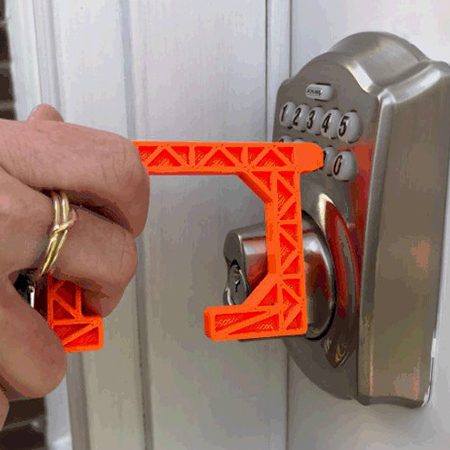Together,
We Advance
Despite a global pandemic, Broad Spartans had the courage to step up, support others and advance through challenges — together.
Safeguarding Summer Internship Experiences
Broad faculty and staff deepen connections with corporate leaders and alumni to ensure student success.
FEATURE
The COVID-19 pandemic has had a tremendous impact around the world, causing massive amounts of change and uncertainty. For students, one difficult change came with companies rescinding or modifying summer internship programs, which are not only valuable to improve professional opportunities but also, for many, serve as an important source of funding for ongoing tuition expenses.
To address this change and provide for our students, Broad faculty and staff took the lead to safeguard summer internship experiences by deepening connections with corporate leaders and alumni.
The connection point for corporate leaders
The Russell Palmer Career Management Center boosted its efforts amid the pandemic by creating an environment for companies to connect and problem solve together.
“As we’ve been working with companies dealing with the COVID-19 situation, we discovered many of them wanted to know more about what other companies are doing related to hiring,” Marla McGraw, director of career management, said. “We decided to host company group Zoom discussions arranged by industry as a solution to bring company leaders together.”
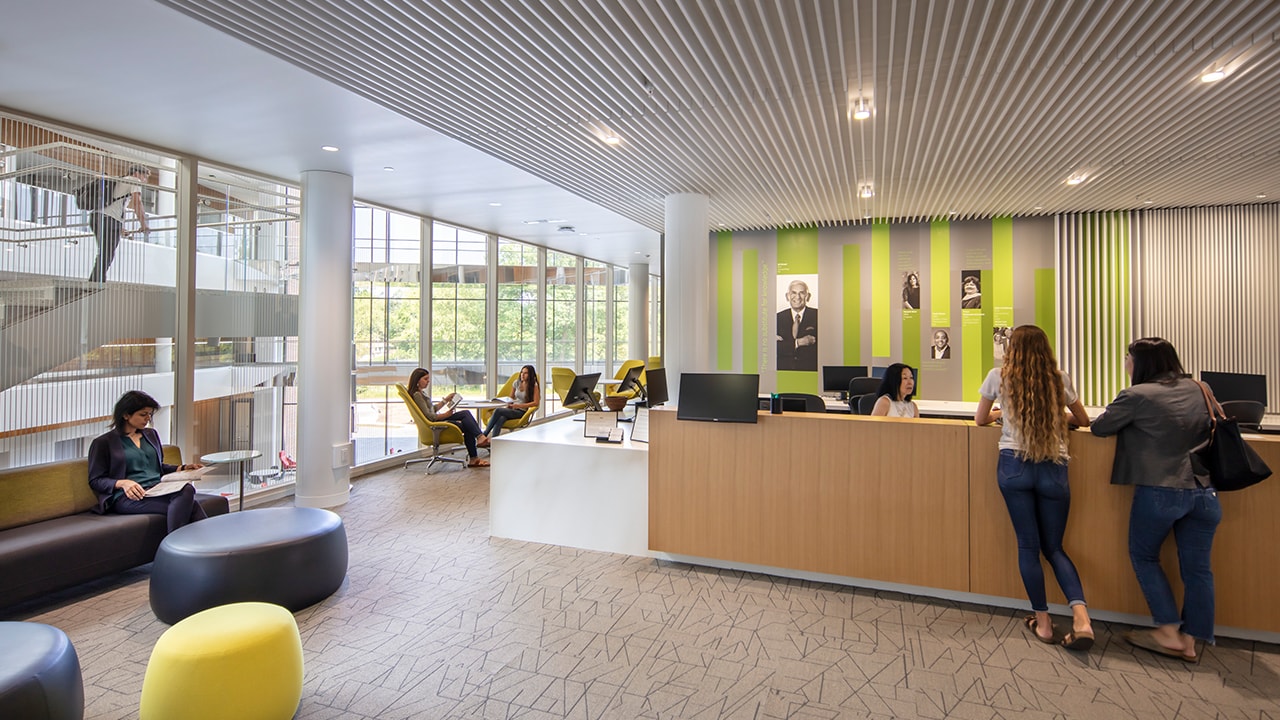
Russell Palmer Career Management Center in the Minskoff Pavilion
Interest from companies was piqued, with more than 50 company representatives from a range of industries participating in the first set of discussions in March.
Overall themes for the discussions centered on sharing how work was being affected, plans for fulfilling full-time employment and internship offers and exploring ongoing opportunities for remote working.
“We’re helping companies find ways to offer virtual training, virtual social activities and generally how to keep students engaged throughout this time.”
—MARLA MCGRAW
“Based on what we’re hearing from the conversations, most companies are trying very hard to honor the offers they’ve made to students,” McGraw said. “They’re pushing back start dates, honoring relocation stipends despite remote working and connecting to find genuine tactics to get through this.”
The Palmer Center followed this up with a round of virtual discussions offering best practices for companies conducting virtual internships.
“We want to provide the opportunity for companies to continue connecting with one another to offer the best experiences going forward,” McGraw said. “We’re helping companies find ways to offer virtual training, virtual social activities and generally how to keep students engaged throughout this time.”
In addition, the Palmer Center collaborated with six business schools and dozens of companies across the country to orchestrate a week-long virtual career fair for graduate students in May.
Banding together with alumni
Helen Dashney, fixed-term faculty in finance, and her husband, Mac, were inspired to create the Summer Consulting Project in response to the pandemic’s impact on student internships. Together with generous support from various alumni, the Dashneys’ project funded 33 students to work on 16 remote projects across eight companies this summer.
“I wanted to find some way to help our students,” Dashney explained. “My husband and I felt that starting the Summer Consulting Project would be a great way for students to demonstrate their resiliency in overcoming disappointment and making the most of their situation while gaining new skills. And, of course, the companies benefit from pro bono assistance where they may be understaffed due to job cuts or furloughs.”
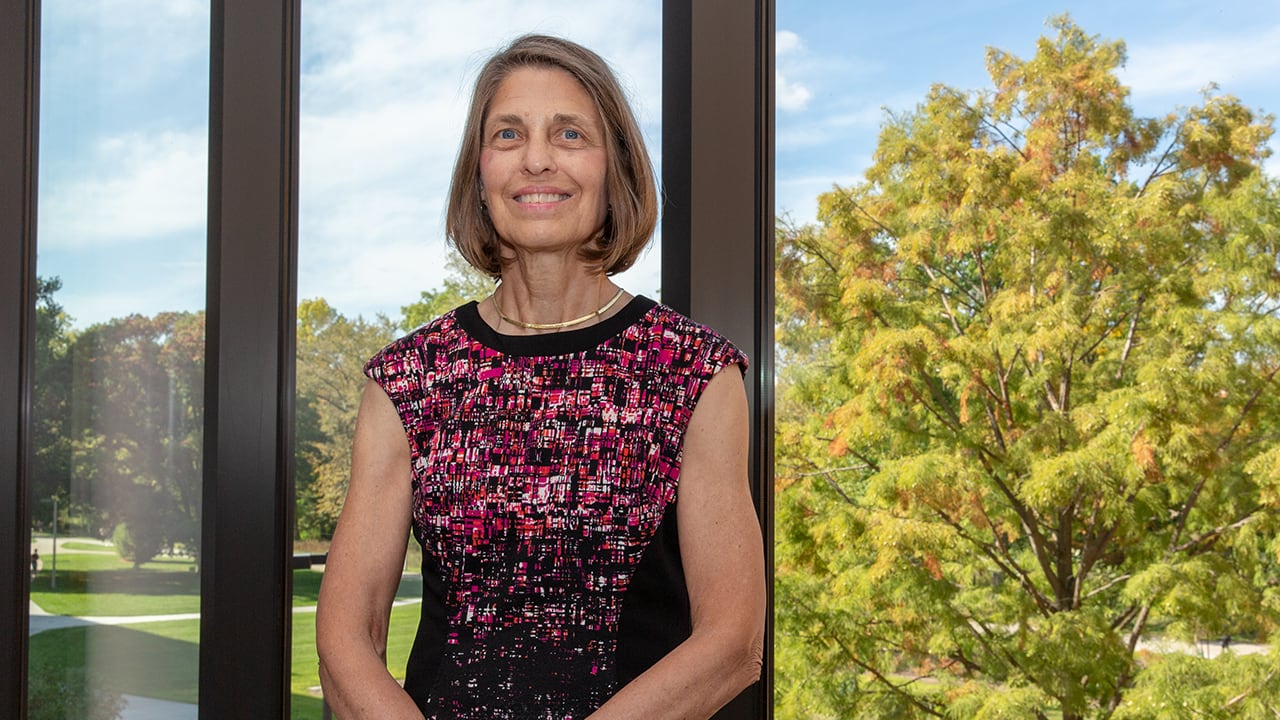
Helen Dashney, fixed-term faculty in finance, led the Summer Consulting Project
Dean Sanjay Gupta supported and elevated Dashney’s work, circulating the request to the Broad College Advisory Board and offering to match some of the funds raised.
“When Helen approached me with the idea, there was no hesitation. Many of our students have had their professional internships changed, and the Summer Consulting Project offers a solution,” Gupta said. “The Broad College faculty, staff and especially the Palmer Center have continually put their best foot forward to help students during this time. The Summer Consulting Project is just another example of how we are offering support to those in our community who need it most: our students.”
Alumni connections on the Broad College Advisory Board and the Broad College Development and Alumni Relations team, together with affiliations Dashney has built during her 24-year career with the Broad College, enabled opportunities at Amway, Apple, FUEL, Meritor, MSUFCU, Texties/Acceleron Corp., Tri-State Cast Technologies and Worldwide Express. Projects covered everything from product research and industry analysis to improving reporting and metrics to crafting marketing campaigns and social media plans.
“The Summer Consulting Project is just another example of how we are offering support to those in our community who need it most: our students.”
—DEAN SANJAY GUPTA
“I don’t feel like an external consultant,” Meehika Patel, a Full-Time MBA student who interned with Apple, said. “I have met some incredible people who have spent the majority of their career at Apple and have been part of its growth from when the first iPhone was launched to now. They have spent time getting to know me and my interests to ensure I am having a meaningful experience.”
Dashney added, “It really was a community effort, from the faculty and staff who helped iron out the details and our alumni who offered and created opportunities for our students. We owe our Broad Spartan alumni a huge thank-you for making this all possible and for investing in our students.”
Thanks to the inspiring efforts of our faculty, staff and alumni, Broad Spartans were able to have meaningful summer internship experiences despite the overwhelming changes of the pandemic. It’s this Spartan spirit and determination that allows us to advance together.
STRENGTH IN NUMBERS
Broad Spartans Stand Together
From Michigan to Mumbai, our alumni were a force for good in the face of the global pandemic.
ALUMNI
The coronavirus pandemic has brought on a tidal wave of uncertainty, change and challenges for countless communities around the world. But with persistence and grit, Spartans have been able to overcome these challenges and work together to get through the crisis.
Many Broad alumni have led their businesses to be a force for good: rapidly shifting operations to produce medical supplies, making significant donations for first responders and reaching out to offer support for those in need.
Making an impact, from Michigan to Mumbai
In a matter of days at the beginning of the pandemic, Detroit became one of the nation’s hot spots for the spread of the coronavirus. Many alumni quickly rose to the occasion to aid health workers and first responders in the area.
- Mark Rieth (B.A. General Business ’89), owner of Atwater Brewery, shifted operations from producing spirits to hand sanitizer.
- Dan Gilbert (B.A. Telecommunication ’83) and Jay Farner (B.A. Finance ’95) led Rock Ventures and Quicken Loans, Detroit’s largest employer, to take action through unique partnerships.
- Linda Hubbard (B.A. Accounting ’82), president and COO of Carhartt, led the company to produce 2.5 million medical masks and 50,000 gowns for critical workers.
- Ray Scott (MBA ’02), CEO of Lear Corporation, donated thousands of protective masks and published the Lear Playbook, which offers guidelines for factories to maintain safe working environments.
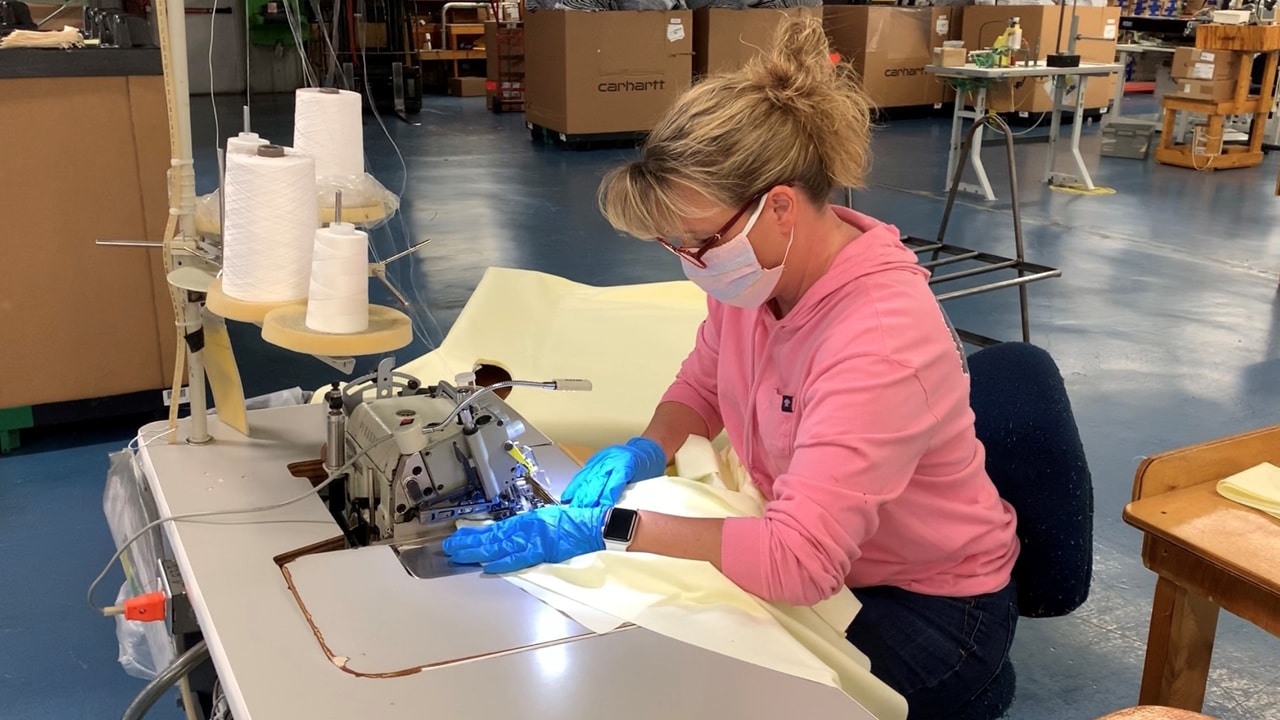
A Carhartt employee sews together a medical gown
Beyond Detroit, Broad Spartans stepped up to serve those in need throughout Michigan, across the United States and even in other parts of the world.
- Blake Krueger (B.A. General Business Administration ’75), chair, president and CEO of Wolverine Worldwide, donated thousands of shoes and boots to hospitals, police and fire departments in western Michigan.
- Greg Longstreet (B.A. General Business ’92), CEO of Del Monte Foods, led the company to donate $2 million in food products to support food banks and nonprofit programs around the country.
- Milind Agarwal (MBA ’94), founder and CEO of Quickwork and founder of MSU’s Alumni Club of India, presented free webinars to companies affected by COVID-19.
Demonstrating agility and resourcefulness
Numerous companies rapidly shifted operations to source, produce and deliver essential supplies to meet urgent needs for health care workers around the world, with Broad Spartans leading the way.
- Christine Sitek (B.A. Material and Logistics Management ’89), executive director of global purchasing and supply chain at General Motors, sourced the parts necessary for ventilator production.
- Priya Balasubramaniam (MBA ’01), VP of operations at Apple, helped the company’s efforts to produce and ship over 1 million face shields per week.
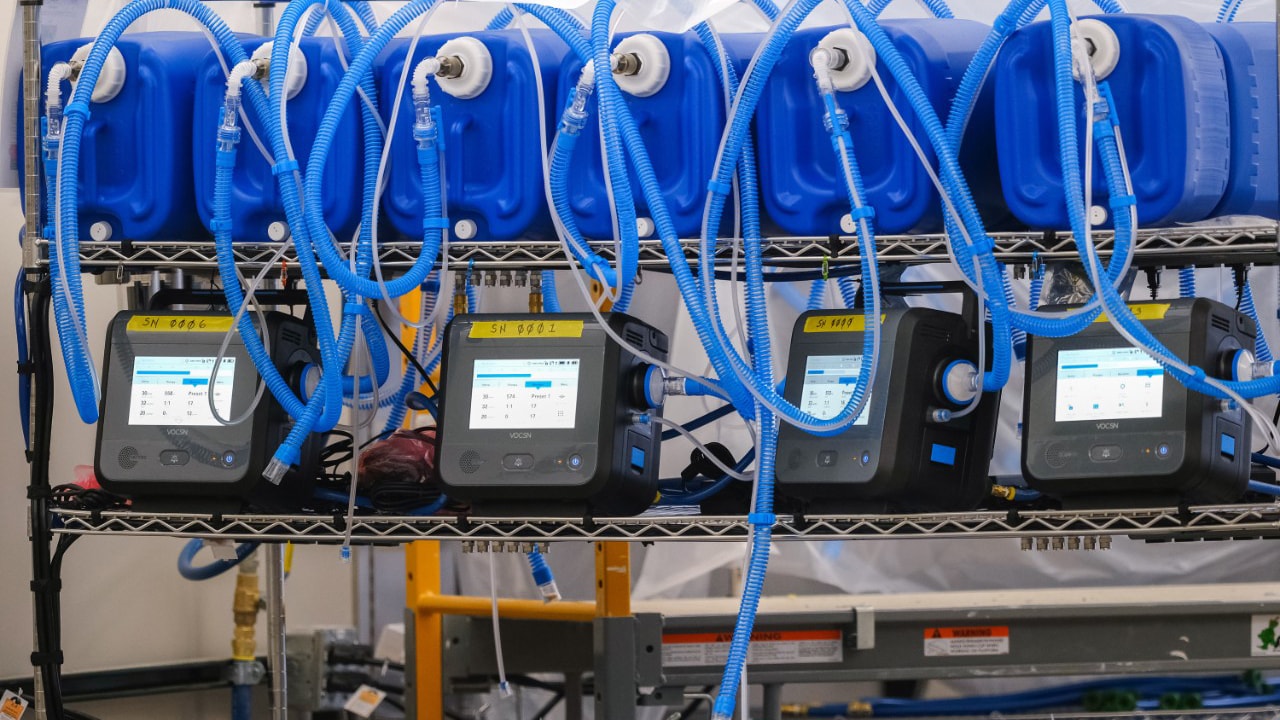
General Motors’ ventilator production at its manufacturing facility in Kokomo, Indiana
Fostering a support systeM
Broad Spartans also found ways to uplift each other, offering support and resources for their employees and customers in outstanding ways.
- Greg Matlock (B.A. Finance ’01), EY’s Americas Energy and Resources Tax Leader, helped deploy a tracking tool for ongoing tax and stimulus policy changes happening around the world.
- Todd Penegor (B.A. Accounting ’87, MBA ’89), CEO of Wendy’s, increased hourly pay and offered free meals to employees.
- Craig Menear (B.A. Personnel Administration ’79), CEO of Home Depot, employed a multipronged approach to put safety first for his employees and customers.
- Mark Bierley (B.A. Accounting ’88), CEO of Learning Care Group, ensured child care and education services for essential workers and their families.
- Dennis Eidson (B.A. Business Administration ’76), chairman of the board and interim president and CEO of SpartanNash, led the West Michigan-based company to hire 3,000 associates and deliver substantial bonuses for its frontline associates.
- Carrie Dorr (B.A. General Business Administration ’96), entrepreneur and founder of Pure Barre, Soul Day Foundation and O44 Method, provided a series of at-home workout classes and self-healing exercises, free of charge.
“As leaders, there is no more important time to absorb anxiety versus creating anxiety,” he said. “Know what your ‘North Star’ is and let that guide your decisions … You’ll have to use your instincts.”
—CRAIG MENEAR, CEO & PRESIDENT OF HOME DEPOT
Being a Spartan is an ideal that encompasses individual strength, collective power and extraordinary impact. These are just a small collection of the many alumni who stepped up in inspiring ways to overcome the world’s challenges amid COVID-19 together and prove that without a doubt, Spartans Will.
STRENGTH IN NUMBERS
Students Set the Standard High
The pandemic was a source of motivation for Broad Spartans to do more and make an impact.
STUDENTS
When times are tough, Broad Spartans step up. In the face of the pandemic, many of our students showed strength, resiliency and creativity to make an impact.
When MSU made the necessary transition to remote learning in March, some students didn’t take the new social distancing recommendations seriously. As hundreds were relishing the East Lansing bar scene, Abhishek Tekumulla, a junior in finance, was inspired to write an open letter to fellow Spartans, urging them to change behaviors.
“Yes, you’re right, the chances of surviving the virus are high, but the prevalence of symptoms of COVID-19 remain high as well,” Tekumulla wrote. “As college students, we may not even realize we’ve contracted the virus. It could be a minor temperature, or a cough. Regardless, we have a strong enough immune system to get over it within a few days.
“Yet, in that period, people around us can also contract the virus, just by being in our presence. From a shake of a hand to a gentle bump at the bar, the virus can spread, but it’s just a cough, right?”
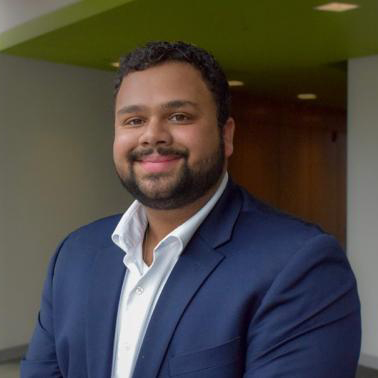
Abhishek Tekumulla, finance junior
Tekumulla shared the letter on his personal LinkedIn page, and MSU elevated his message to its MSUToday website.
“There’s a simple way of lessening the prevalence of cases and it’s called social distancing, NOT social isolation. Social distancing is simply avoiding large crowds where the virus can spread. Social isolation is a state of complete lack of contact with others, which no one is asking you to do.”
Tekumulla closed the letter with a powerful statement: “It’s our civic duty as college students to work together in slowing down this virus for good.”
Inspiring words of advice
Like Tekumulla, Daisy Wu, a master’s student in accounting, felt the need to share a message of strength with fellow Spartans.
Before the pandemic hit, Wu was fortunate enough to secure a full-time offer as a consulting analyst at the Barthwell Group, a small management consulting firm in Detroit. To complement her internship experiences at several of the Big Four accounting firms, she was eager to join a smaller firm.
“At this point in my career, I value the opportunity to work for a boutique consulting firm as there are unique benefits I can gain from experience,” she said. “This kind of exploration is a necessity for students at the start of their careers for great professional development.”
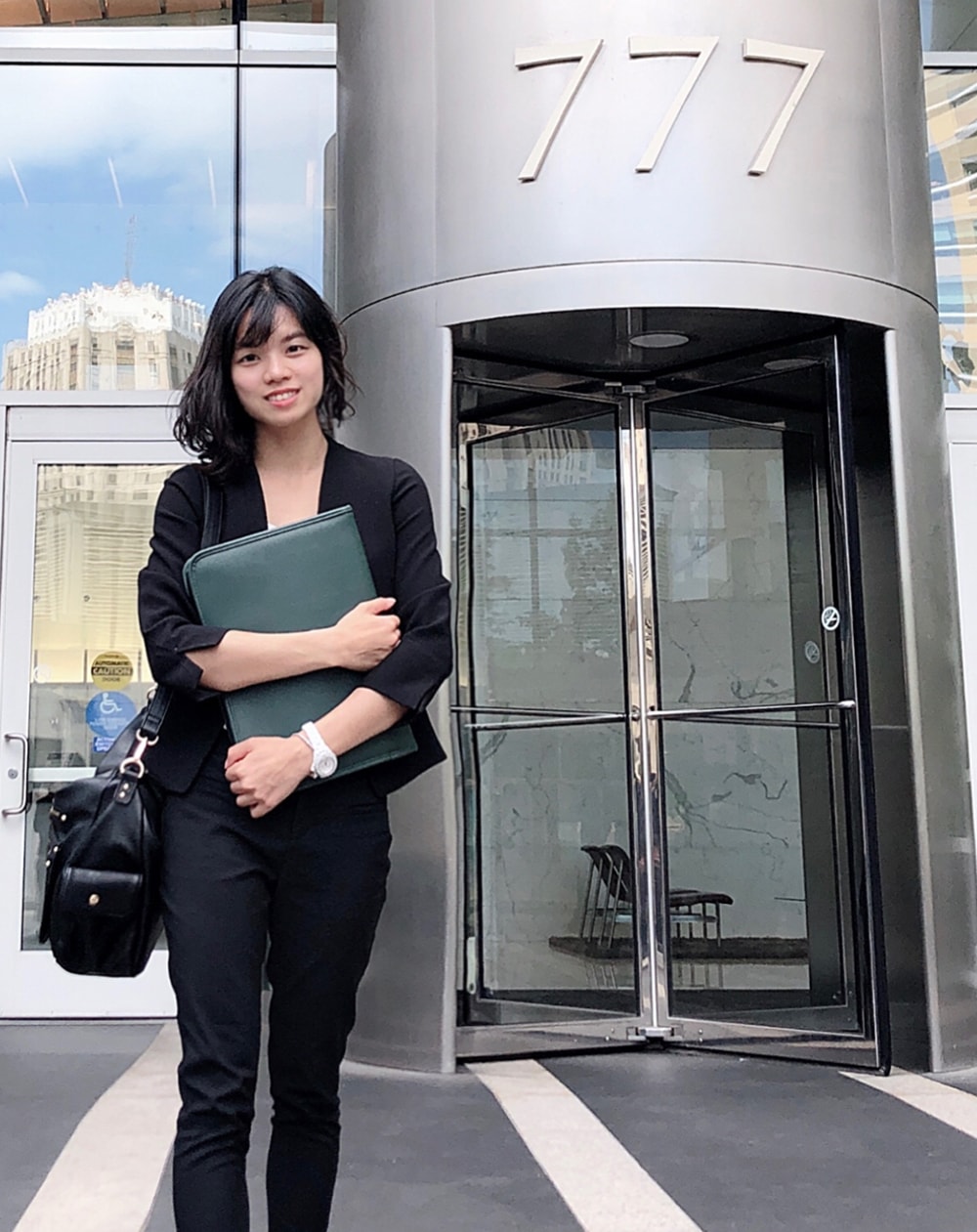
Daisy Wu, master’s accounting student
While enthusiastic about her next career move, Wu also recognized that many of her fellow Spartans may not have been in her situation. She sympathized and offered inspiring words of advice for those who had offers rescinded.
“The most important thing is to trust your own value,” she said. “Companies extend offers because they see value, and even if circumstances change and the offer is no longer available, you still have value.”
Wu also encouraged Spartans to use their work-from-home experiences for their own benefit. “With everything happening, there are likely to be changes in business and new trends. Find common ground between your passion and new trends and develop that skill set.”
Bolder by design
Executive MBA student Gabriel Escudero Borges employed his Spartan spirit by designing the No-Touch Tool to help people avoid touching surfaces when leaving their home during the pandemic.
“I was out for a run when I realized that I had to use my finger to press the buttons to cross streets,” Borges explained. “Also, during the same run, I entered a gas station to get water, and I had to touch the door handle to pull it on my way in and then push it open on my way out.
“That’s when I first thought of designing a tool that was portable and that helps you open and close doors and push buttons at any time without having to touch the surfaces with potential germs.”
Borges quickly went to work, developing a lightweight but sturdy design with two basic features: a hook to open door handles and a head to help press buttons. He also added a small hole at the end so that the tool could become a keychain.
Designing the tool came easy for Borges, who has a degree and several years’ experience working in industrial engineering.
Borges currently works as a program manager for Adler Pelzer Group, in the auto industry, and partnered with a supplier to 3-D print his No-Touch Tool. He’s been selling the product for $10 each and spreading the word through his personal social media.
Taking things a step further, Borges decided 100% of his proceeds will be donated toward COVID-19 research. “The World Health Organization has opened a space where you can donate to help fight COVID-19, so this is where I’m planning for the funds to go,” he said. “The more I sell, the more I can donate.”
Through these students’ stories and more, it’s clear that the pandemic served as a source of motivation for Broad Spartans to set the standard high, doing more and making an impact for those around them to advance together.
STRENGTH IN NUMBERS
Research to Combat Zoom Fatigue
The need-to-know information about virtual meetings from our expert on teams and teamwork.
RESEARCH
The digital transformation of business became inescapable for millions of people amid the COVID-19 pandemic. As the world transitioned to working from home, Zoom calls and other virtual meetings became the new norm for communicating with colleagues. But what makes for an effective virtual meeting? And how could we make this transition smoother?
In May, John Hollenbeck, Eli Broad Professor of Management, wrote an article for Business Insider, applying his extensive research on teamwork to the global pandemic to help people combat Zoom fatigue and improve virtual communications. The following has been adapted from his article.
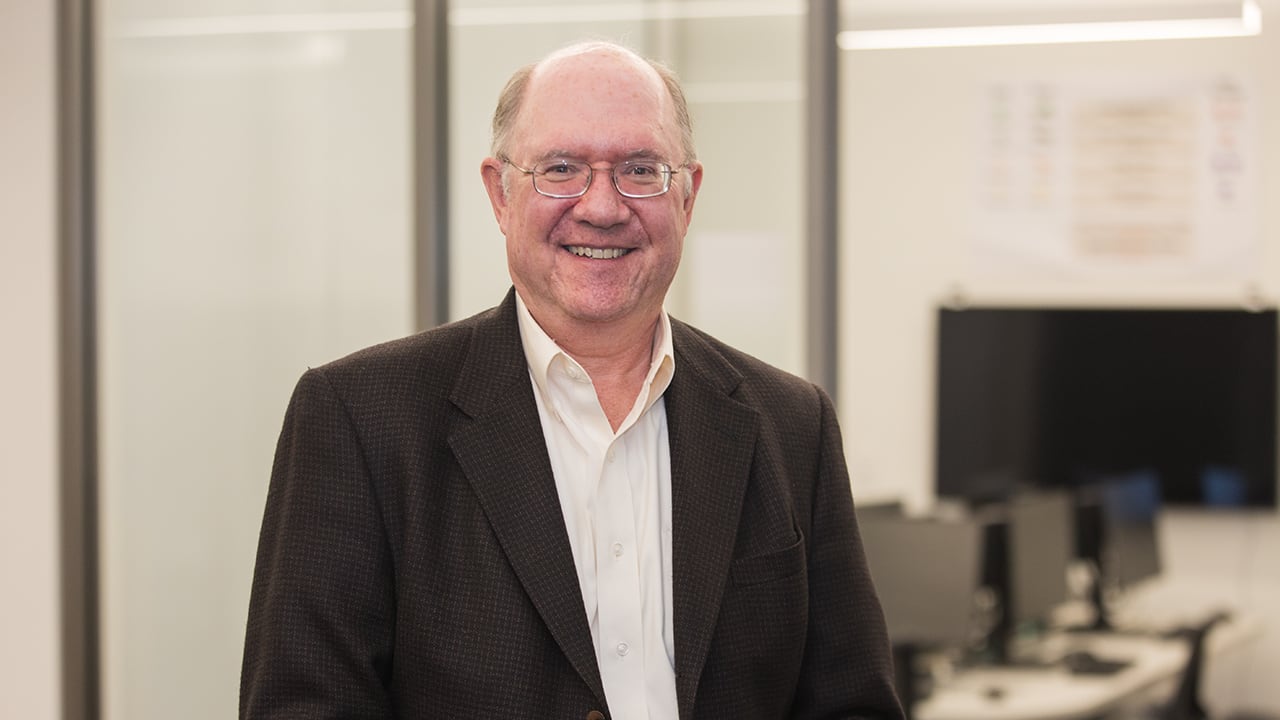
John Hollenbeck, Eli Broad Professor of Management
Five is the magic number
There’s a basic tenet among those of us who study management that big teams are bad teams.
Effective communication and coordination begin to break down in groups larger than five. This has always been true; it’s simply more obvious in the virtual world because the nonverbal cues that help us slide by in large face-to-face meetings have been snatched away.
The enemy of large teams is the number of communication links that have to be managed. As team size grows linearly, the links among team members grow exponentially. A five-person team has to manage 10 links, while a 10-person team has to manage 45. And a 15-person team? Forget about it: 105 links.
Thus, a growing team quickly bumps against the limits of our human capacity for communication. We simply didn’t evolve to be able to effectively communicate with 10 or 20 people at one time. There are also limits on the total number of people we can maintain social relationships with across all areas of our lives.
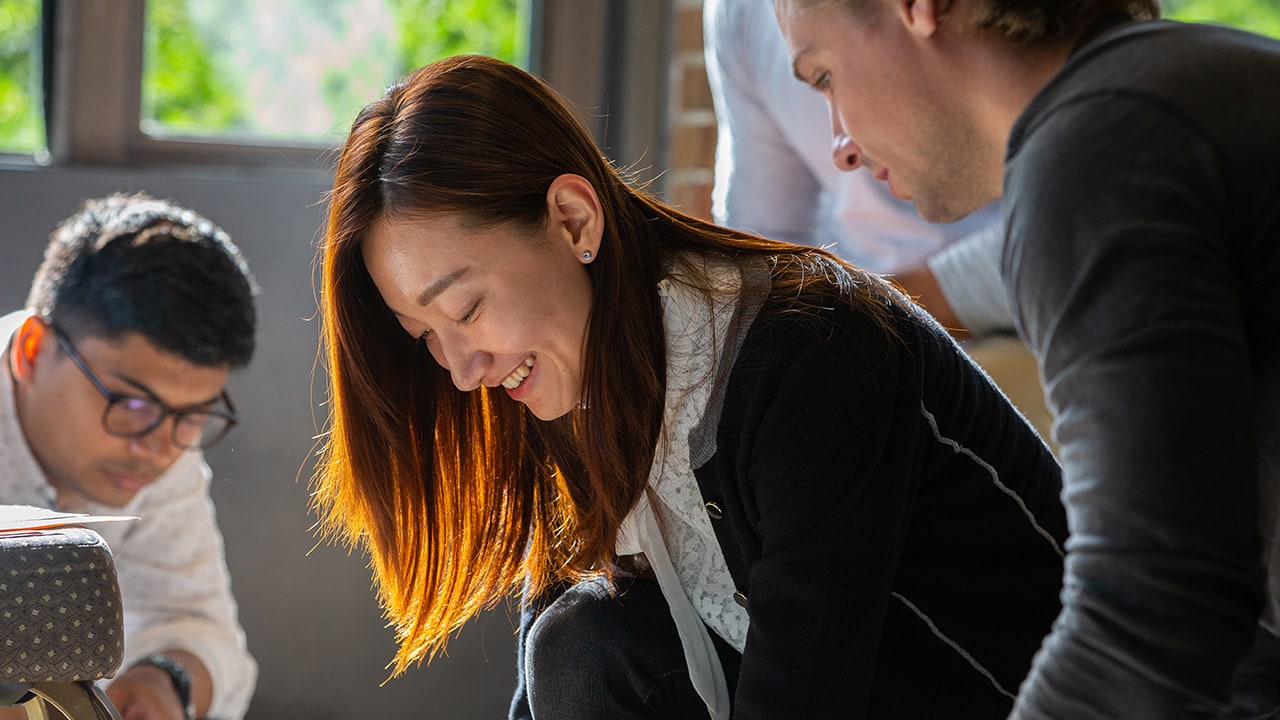
Full-Time MBA students work in teams at the Extreme Green Corporate Innovation event
After studying primate social groups and traditional human tribes, anthropologist Robin Dunbar determined that our brains can’t manage more than 150 stable social relationships, a constraint known as “Dunbar’s number.” In the modern world, this capacity is divided across numerous professional and personal networks.
The power of multi-team systems
Does this mean we can never have a business unit bigger than five or an organization larger than 150? Of course not. It’s not the absolute size of a group that matters, it’s about how we organize individuals and the communication links among them.
For instance, if you have a 25-person engineering team, you can split them into pods of five. Communication across pods happens among the five leaders of each pod, who then share relevant information back with their respective groups. This structure creates just 10 communication links within each of the sub-teams and roughly 15 links for members of the leadership team to manage, compared to 300 links in a 25-person team!
This structure is called a multi-team system, and it’s been very successful across a wide range of organization types.
Much of my research on teamwork and multi-team systems has been funded by the Department of Defense and the National Science Foundation. Even though military operations and large collaborative science efforts are very different tasks, the multi-team system structure works well in both contexts. It allows for a super-team with large size and scope, and thus extensive expertise, while at the same time limiting the number of communication links that have to be managed.
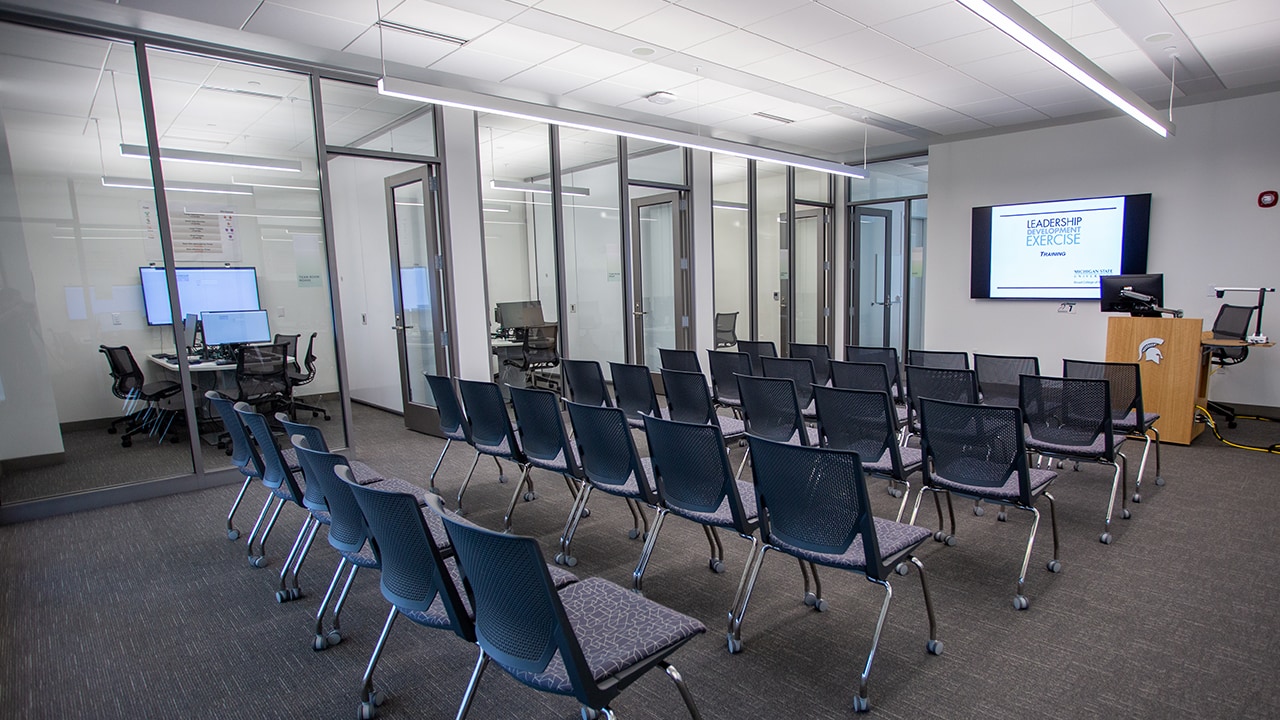
Kesseler Team Leadership Lab in the Minskoff Pavilion
Escape video-call misery
You don’t have to completely reimagine your organizational structure, especially in a chaotic moment like the one we are currently facing. You can reap many of the benefits of multi-team systems right now by creating clear structures and rules for communication when working remotely.
“The most important rule is to never have a meeting with more than five people.”
—JOHN HOLLENBECK
Sticking to the five-person limit can feel hard, but it forces you to think carefully about how your team members interact and who actually needs to be in a particular meeting.
This doesn’t mean you can’t host a virtual gathering of more than five people. There may be times leaders need to communicate information to a large number of people at once through a one-way broadcast, or a small group of leaders engaged in a discussion may want their team members watching over their virtual shoulders with the mute button on. As I mentioned earlier, it’s about the number of communication links happening, not necessarily the total number of people observing the collaborative process.
Every virtual meeting should have a clear agenda and norms for how communication will rotate. Without nonverbal cues, it’s much harder for people to know when to step in and talk. Leadership roles should be clear, including the formal leader, aka the boss; a technology leader managing meeting logistics; and the information leader, who is sharing information on a given topic (this position often rotates over the course of a meeting).
These guidelines don’t just apply to virtual meetings. We’ve all been caught in a nightmarish reply-all email thread or CC’d on a communication that was barely relevant. You can avoid wasting people’s time by establishing clear norms and expectations about who should be looped into various conversations and who is expected to pass along essential information to those who are not part of a discussion.
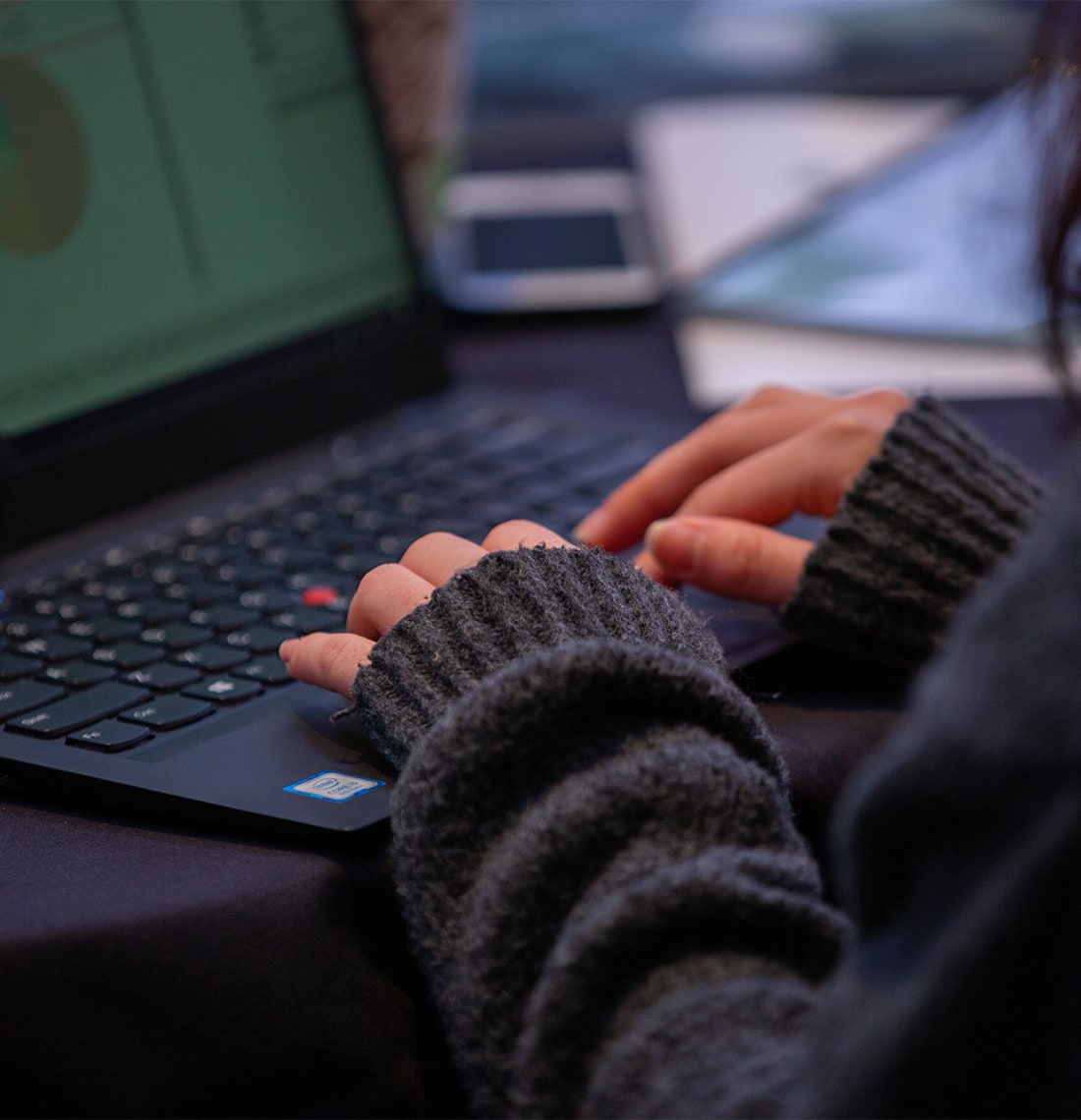
Five is the magic number for virtual and in-person meetings
Learning from exceptional circumstances
We’re still adapting to a massive disruption in our normal professional lives and it’s no surprise that our virtual communication is a work in progress, especially given that our face-to-face communications could stand to improve too. But it may help to know that there’s a reason your 15-person Zoom meeting feels like such a slog — we just weren’t wired to communicate that way.
The good news is that you can implement simple solutions that don’t require new technology or a shake-up of your entire org chart. You can see big gains in efficiency and morale by layering a multi-team system for communication on top of your existing structures and outlining clear processes and expectations for how communication should flow.
We might even find the stresses of virtual communication offer an opportunity that forces us to be more thoughtful about how we’re communicating in general. Hopefully there are some lessons and systems we can carry forward into our normal operations, since this is how we should have been doing things all along.
LISTEN TO JOHN HOLLENBECK TALK ABOUT TEAMS ON THE SPARTAN BIZCAST
In addition to Hollenbeck’s work, numerous Broad faculty across departments made an effort to reach others with their research and make a difference during the pandemic. From weighing in on proper handwashing and how CEOs can fight COVID-19 to understanding shipping concerns and offering live, free webinars on a myriad of topics, our faculty showed how we can all get through this together.



